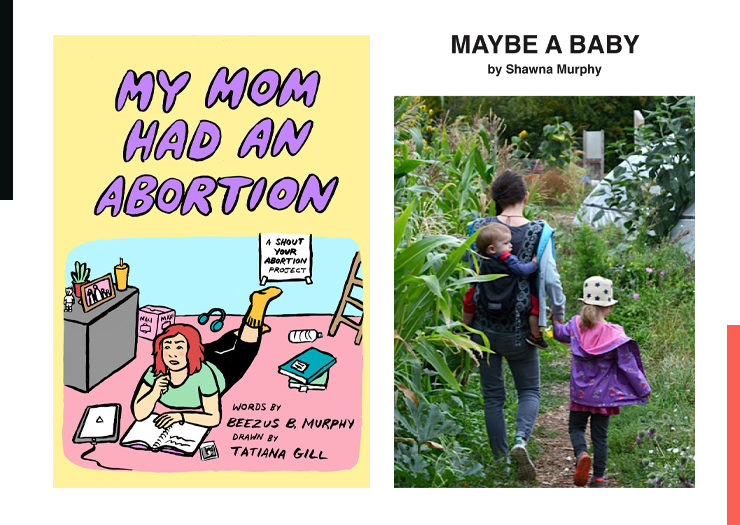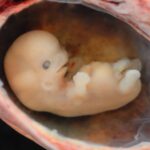Blog Post
“Maybe a Baby”: New children’s book tries to normalize abortion
By Jonathon Van Maren
Back in June, I wrote about a new book titled What’s an Abortion, Anyway? Written by two LGBT “abortion doulas” who had collectively helped women have thousands of abortions, the children’s book was written to justify aborting children to other children. For progressives, abortion is now a social good, and to blunt the instinctive horror children often feel when they encounter the idea of abortion, there are now books to justify and explain the decision. In 2021, nothing is an “adult” topic anymore.
Rewire News is reporting that with the assistance of the radical group Shout Your Abortion, two others are taking a crack at introducing feticide to children, this time taking it a step further. Shawna Murphy had previously written a children’s book called Maybe a Baby, which Rewire describes as “an easy-to-understand, heartfelt depiction of a mother sharing her abortion story with her child.” Beezus is her daughter, and wrote a graphic novel called My Mom Had an Abortion to tell the story from her perspective.
The perspective of the baby who died during the abortion, of course, is left out. According to Shawna:
As an early learning teacher, Shawna said the language she chose in the book was very intentional. She interviewed 11 other people about their pregnancy experiences to get the book just right.
“I talked to a man who had had a baby. A parent who adopted her children. A parent who had had abortions, miscarriages, placed children for adoption and is now raising children she also gave birth too. A lesbian family. A librarian. Therapists. … I talked to a lot of parents,” she said. “We all agreed that my story didn’t need to include ‘the other side’ or that there are people who vehemently oppose abortion. That’s not what this story is about. My story is about the many fruitions of pregnancy. Maybe a Baby, because for me, that’s what a pregnancy is.”
Maybe a Baby features photographs of Shawna and her two daughters alongside dialogue explaining that a pregnancy means just that—maybe a baby. Discussing abortion and pregnancy loss, Shawna tells her daughter that she’s been pregnant five times, and two have made babies.
“But you love babies!” Shawna’s daughter asks at one point in the book.
“I do love babies!” she replies. “Deciding to be a parent is a BIG deal! Everyone gets to have their own reason to have an abortion or try to have a baby. My reason for having an abortion was that I wanted to wait a little longer before becoming a parent so I would be ready to be the best kind of parent I could be.”
Beezus’ book, which is illustrated by cartoonist Tatiana Gill, starts with her mother telling Beezus about her abortion; her only awareness of abortion at that point comes from outside forces, and it has a negative connotation for her. She told Rewire News Group that it’s wasn’t until she learned that a close friend’s mother had an abortion too that she realized her family was not alone.
“I was like, ‘Oh, dip, abortions are normal as hell.’”
That phrase perhaps hits a bit closer to home than Beezus intended.
Shawna says that both books are important because everyone—sometimes even abortionists—“forget to teach their kids about abortion.” Shawna isn’t sure why. “You might have a baby, you might not, but that part is definitely left out of the story when we are talking to kids. Why? Religion? Shame? Guilt? Patriarchal control over bodies with uteruses?”
It’s more than that, of course. Most people don’t tell their children about their abortions because they are ashamed of them. Even when they’ve convinced themselves that they are not, there is something that prevents them from telling their children that they had a brother or a sister that died because of a decision her parent or parents made. I’ve talked to hundreds of women who have had abortions, and none felt like “shouting” it. Their reactions varied from grief to rage to cold apathy, but none of them pretended it was normal.
As Rewire News puts it: “Beezus and Shawna are here to change that. Their books are hopefully the first of many that will not only educate children and young people about abortion, but will drastically shift the landscape of what is considered a ‘normal’ pregnancy outcome. By introducing children and young people to abortion at an early age, books like Maybe a Baby and My Mom Had an Abortion remove the shame and stigma from conversations about abortion and miscarriage and help a new generation understand that pregnancy can mean a lot of things—including, maybe, a baby.”
I’ve talked to many people who lost a sibling through abortion, too. The thing that Shawna and Beezus are ignoring is that the child who was killed during abortion wasn’t “maybe a baby.” She was a baby. Everyone knows it. The book isn’t talking about the pre-born child being maybe a baby—it’s pointing out that only maybe her mother will let her live. If Beezus found out that Ramona was aborted, would she ever wonder what happened to her sibling, or who she would have been, no matter how fiercely she loved her mother and sought to justify the decision? Yes. Yes, she would.
Because deep down, we know the truth. It may be hidden, buried, suppressed, and ignored—but we know. It is why abortion is such a charged topic, and why photographs of abortion victims bring such anger to the surface when they are displayed in public—because these photos reveal that the “maybe babies” didn’t just disappear at the whim of their parents—they were butchered.








